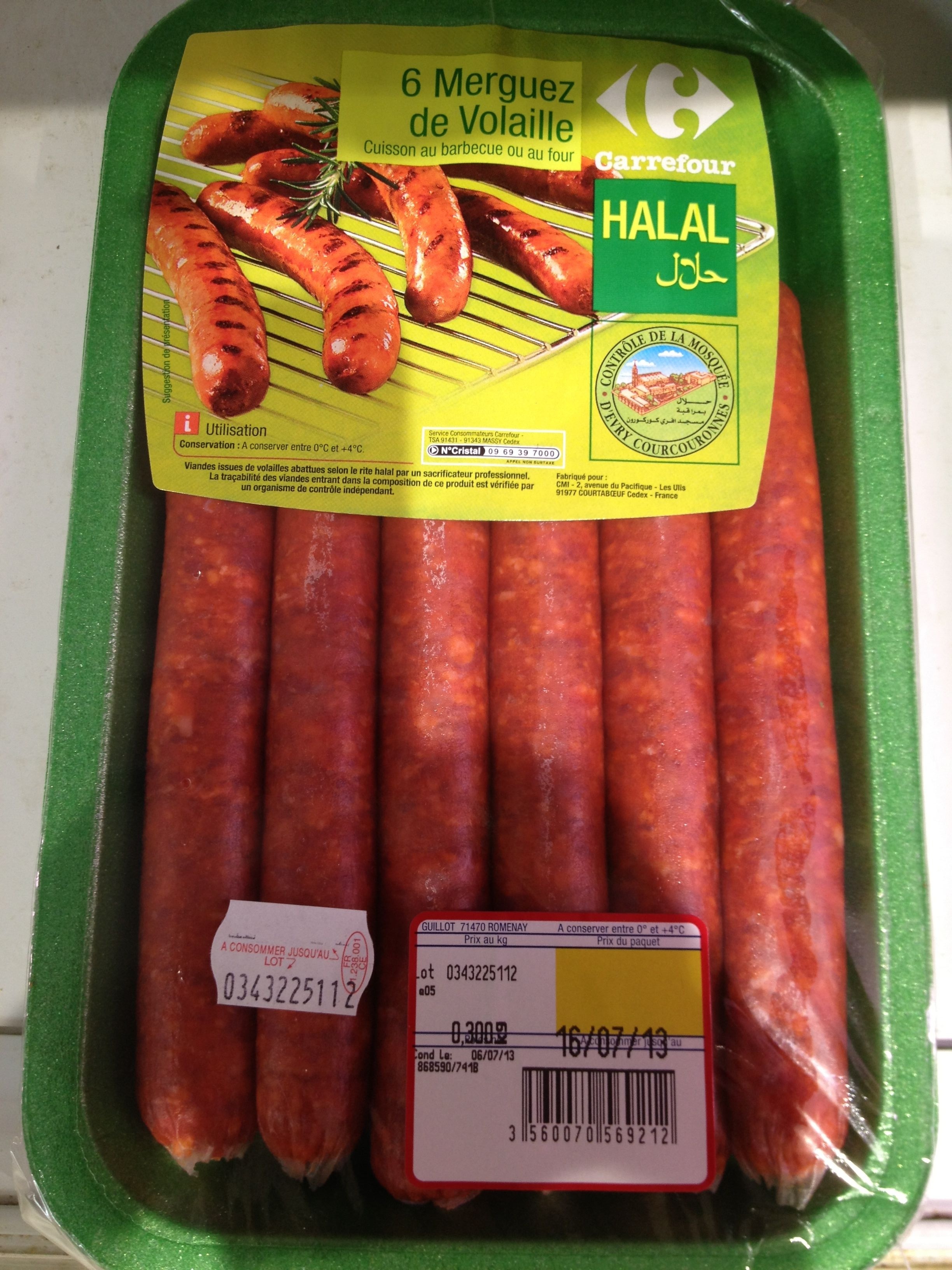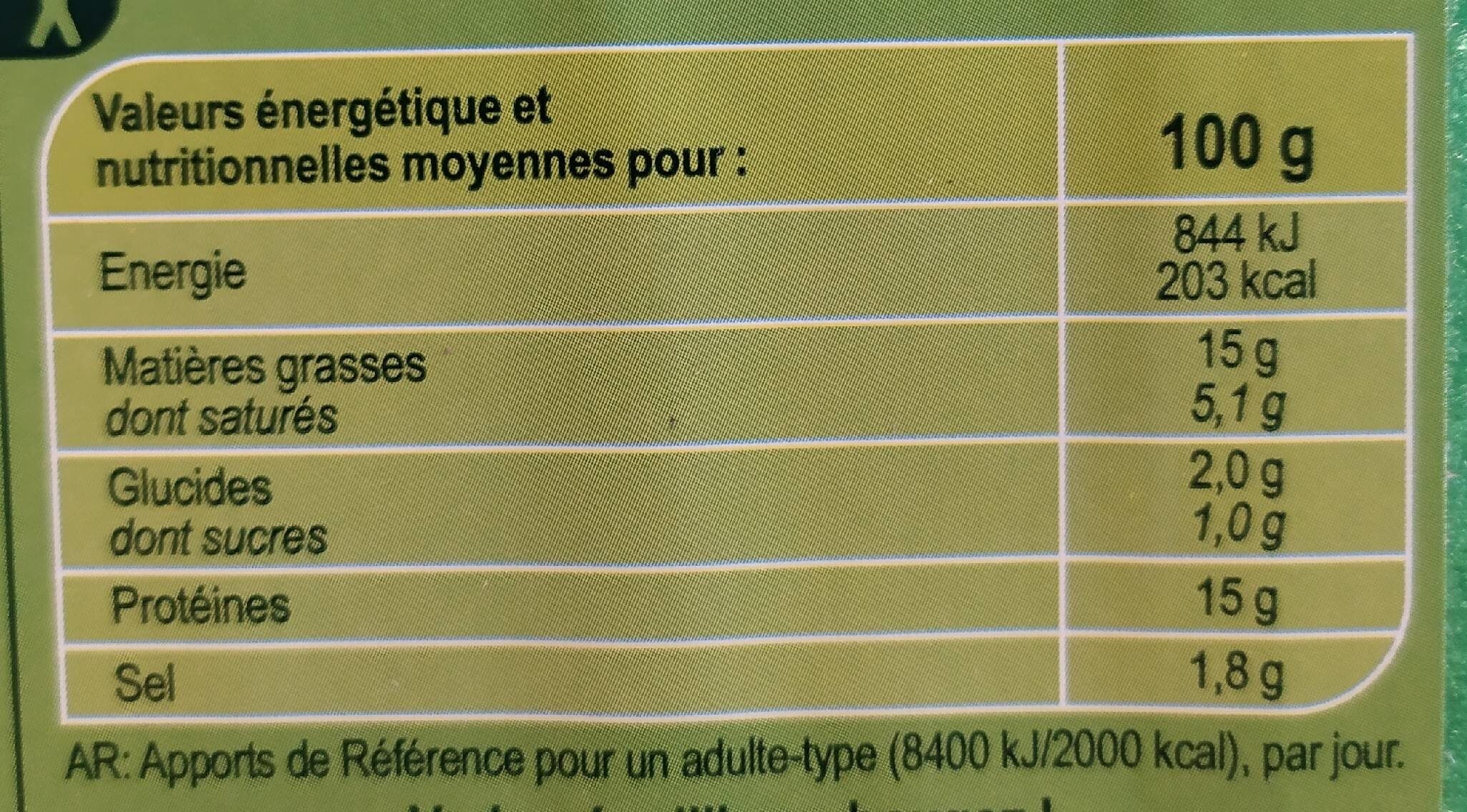Help us make food transparency the norm!
As a non-profit organization, we depend on your donations to continue informing consumers around the world about what they eat.
The food revolution starts with you!
6 merguez de volailles halal - Carrefour - 300 g
6 merguez de volailles halal - Carrefour - 300 g
Important note: this product is no longer sold. The data is kept for reference only. This product does not appear in regular searches and is not taken into account for statistics.
This product page is not complete. You can help to complete it by editing it and adding more data from the photos we have, or by taking more photos using the app for Android or iPhone/iPad. Thank you!
×
Some of the data for this product has been provided directly by the manufacturer Carrefour.
Barcode: 3560070569878 (EAN / EAN-13)
Common name: Merguez halal
Quantity: 300 g
Packaging: Plastic, Film, Protective gas, Tray
Brands: Carrefour
Categories: Meats and their products, Meats, Prepared meats, Sausages, Poultries, fr:Merguez
Labels, certifications, awards:
Halal, fr:Contrôle de la mosquée d'Évry-Courcouronnes

Traceability code: FR 41.238.001 CE - Savigny-sur-Braye (Loir-et-Cher, France)
Stores: Carrefour Market, Carrefour
Countries where sold: France
Matching with your preferences
Health
Ingredients
-
23 ingredients
: Viande de dinde halal 52% : gras de bœuf halal, gras d’agneau halal, eau, acidifiants : lactate de potassium, acétate de calcium, sel, épices, ail, oignon, sirop de glucose de blé, colorant : rouge de betterave, arômes naturels, dextrose de blé, antioxydants : acide ascorbique, ascorbate de sodium, boyau collagène (collagène halal, eau, cellulose)Allergens: Gluten
Food processing
-
Ultra processed foods
Elements that indicate the product is in the 4 - Ultra processed food and drink products group:
- Additive: E162 - Beetroot red
- Additive: E326 - Potassium lactate
- Additive: E460 - Cellulose
- Ingredient: Colour
- Ingredient: Dextrose
- Ingredient: Flavouring
- Ingredient: Glucose
- Ingredient: Glucose syrup
Food products are classified into 4 groups according to their degree of processing:
- Unprocessed or minimally processed foods
- Processed culinary ingredients
- Processed foods
- Ultra processed foods
The determination of the group is based on the category of the product and on the ingredients it contains.
Additives
-
E162 - Beetroot red
Betanin: Betanin, or Beetroot Red, is a red glycosidic food dye obtained from beets; its aglycone, obtained by hydrolyzing away the glucose molecule, is betanidin. As a food additive, its E number is E162. The color of betanin depends on pH; between four and five it is bright bluish-red, becoming blue-violet as the pH increases. Once the pH reaches alkaline levels betanin degrades by hydrolysis, resulting in a yellow-brown color. Betanin is a betalain pigment, together with isobetanin, probetanin, and neobetanin. Other pigments contained in beet are indicaxanthin and vulgaxanthins.Source: Wikipedia
-
E263 - Calcium acetate
Calcium acetate: Calcium acetate is a chemical compound which is a calcium salt of acetic acid. It has the formula Ca-C2H3O2-2. Its standard name is calcium acetate, while calcium ethanoate is the systematic name. An older name is acetate of lime. The anhydrous form is very hygroscopic; therefore the monohydrate -Ca-CH3COO-2•H2O- is the common form.Source: Wikipedia
-
E301 - Sodium ascorbate
Sodium ascorbate: Sodium ascorbate is one of a number of mineral salts of ascorbic acid -vitamin C-. The molecular formula of this chemical compound is C6H7NaO6. As the sodium salt of ascorbic acid, it is known as a mineral ascorbate. It has not been demonstrated to be more bioavailable than any other form of vitamin C supplement.Sodium ascorbate normally provides 131 mg of sodium per 1‚000 mg of ascorbic acid -1‚000 mg of sodium ascorbate contains 889 mg of ascorbic acid and 111 mg of sodium-. As a food additive, it has the E number E301 and is used as an antioxidant and an acidity regulator. It is approved for use as a food additive in the EU, USA, and Australia and New Zealand.In in vitro studies, sodium ascorbate has been found to produce cytotoxic effects in various malignant cell lines, which include melanoma cells that are particularly susceptible.Source: Wikipedia
-
E326 - Potassium lactate
Potassium lactate: Potassium lactate is a compound with formula KC3H5O3, or H3C-CHOH-COOK. It is the potassium salt of lactic acid. It is produced by neutralizing lactic acid which is fermented from a sugar source. It has E number "E326". Potassium lactate is a liquid product that is usually 60% solids but is available at up to 78% solids.Potassium lactate is commonly used in meat and poultry products to extend shelf life and increase food safety as it has a broad antimicrobial action and is effective at inhibiting most spoilage and pathogenic bacteria. Potassium lactate is also used as an extinguishing medium in the First Alert Tundra fire extinguishers.Source: Wikipedia
-
E460 - Cellulose
Cellulose: Cellulose is an organic compound with the formula -C6H10O5-n, a polysaccharide consisting of a linear chain of several hundred to many thousands of β-1→4- linked D-glucose units. Cellulose is an important structural component of the primary cell wall of green plants, many forms of algae and the oomycetes. Some species of bacteria secrete it to form biofilms. Cellulose is the most abundant organic polymer on Earth. The cellulose content of cotton fiber is 90%, that of wood is 40–50%, and that of dried hemp is approximately 57%.Cellulose is mainly used to produce paperboard and paper. Smaller quantities are converted into a wide variety of derivative products such as cellophane and rayon. Conversion of cellulose from energy crops into biofuels such as cellulosic ethanol is under development as a renewable fuel source. Cellulose for industrial use is mainly obtained from wood pulp and cotton.Some animals, particularly ruminants and termites, can digest cellulose with the help of symbiotic micro-organisms that live in their guts, such as Trichonympha. In human nutrition, cellulose is a non-digestible constituent of insoluble dietary fiber, acting as a hydrophilic bulking agent for feces and potentially aiding in defecation.Source: Wikipedia
Ingredients analysis
-
Palm oil free
No ingredients containing palm oil detected
Unrecognized ingredients: fr:gras-de-boeuf-halal, fr:gras-d-agneau-halal, fr:boyau-collagene, fr:collagene-halalSome ingredients could not be recognized.
We need your help!
You can help us recognize more ingredients and better analyze the list of ingredients for this product and others:
- Edit this product page to correct spelling mistakes in the ingredients list, and/or to remove ingredients in other languages and sentences that are not related to the ingredients.
- Add new entries, synonyms or translations to our multilingual lists of ingredients, ingredient processing methods, and labels.
If you would like to help, join the #ingredients channel on our Slack discussion space and/or learn about ingredients analysis on our wiki. Thank you!
-
Non-vegan
Non-vegan ingredients: fr:Viande de dinde halalSome ingredients could not be recognized.
We need your help!
You can help us recognize more ingredients and better analyze the list of ingredients for this product and others:
- Edit this product page to correct spelling mistakes in the ingredients list, and/or to remove ingredients in other languages and sentences that are not related to the ingredients.
- Add new entries, synonyms or translations to our multilingual lists of ingredients, ingredient processing methods, and labels.
If you would like to help, join the #ingredients channel on our Slack discussion space and/or learn about ingredients analysis on our wiki. Thank you!
-
Non-vegetarian
Non-vegetarian ingredients: fr:Viande de dinde halalSome ingredients could not be recognized.
We need your help!
You can help us recognize more ingredients and better analyze the list of ingredients for this product and others:
- Edit this product page to correct spelling mistakes in the ingredients list, and/or to remove ingredients in other languages and sentences that are not related to the ingredients.
- Add new entries, synonyms or translations to our multilingual lists of ingredients, ingredient processing methods, and labels.
If you would like to help, join the #ingredients channel on our Slack discussion space and/or learn about ingredients analysis on our wiki. Thank you!
-
Details of the analysis of the ingredients
We need your help!
Some ingredients could not be recognized.
We need your help!
You can help us recognize more ingredients and better analyze the list of ingredients for this product and others:
- Edit this product page to correct spelling mistakes in the ingredients list, and/or to remove ingredients in other languages and sentences that are not related to the ingredients.
- Add new entries, synonyms or translations to our multilingual lists of ingredients, ingredient processing methods, and labels.
If you would like to help, join the #ingredients channel on our Slack discussion space and/or learn about ingredients analysis on our wiki. Thank you!
: Viande de dinde halal 52% (gras de bœuf halal), gras d'agneau halal, eau, acidifiants (lactate de potassium), acétate de calcium, sel, épices, ail, oignon, sirop de glucose de blé, colorant (rouge de betterave), arômes naturels, dextrose de blé, antioxydants (acide ascorbique), ascorbate de sodium, boyau collagène (collagène halal, eau, cellulose)- Viande de dinde halal -> fr:viande-de-dinde-halal - vegan: no - vegetarian: no - percent_min: 52 - percent: 52 - percent_max: 52
- gras de bœuf halal -> fr:gras-de-boeuf-halal - percent_min: 52 - percent_max: 52
- gras d'agneau halal -> fr:gras-d-agneau-halal - percent_min: 3.2 - percent_max: 48
- eau -> en:water - vegan: yes - vegetarian: yes - ciqual_food_code: 18066 - percent_min: 0 - percent_max: 33.3333333333333
- acidifiants -> en:acid - percent_min: 0 - percent_max: 22.4
- lactate de potassium -> en:e326 - vegan: yes - vegetarian: yes - percent_min: 0 - percent_max: 22.4
- acétate de calcium -> en:e263 - vegan: yes - vegetarian: yes - percent_min: 0 - percent_max: 14.9333333333333
- sel -> en:salt - vegan: yes - vegetarian: yes - ciqual_food_code: 11058 - percent_min: 0 - percent_max: 11.2
- épices -> en:spice - vegan: yes - vegetarian: yes - percent_min: 0 - percent_max: 8.96
- ail -> en:garlic - vegan: yes - vegetarian: yes - ciqual_food_code: 11000 - percent_min: 0 - percent_max: 7.46666666666667
- oignon -> en:onion - vegan: yes - vegetarian: yes - ciqual_food_code: 20034 - percent_min: 0 - percent_max: 6.4
- sirop de glucose de blé -> fr:sirop-de-glucose-de-ble - vegan: yes - vegetarian: yes - percent_min: 0 - percent_max: 5.6
- colorant -> en:colour - percent_min: 0 - percent_max: 4.97777777777778
- rouge de betterave -> en:e162 - vegan: yes - vegetarian: yes - percent_min: 0 - percent_max: 4.97777777777778
- arômes naturels -> en:natural-flavouring - vegan: maybe - vegetarian: maybe - percent_min: 0 - percent_max: 4.48
- dextrose de blé -> en:wheat-dextrose - vegan: yes - vegetarian: yes - percent_min: 0 - percent_max: 4.07272727272727
- antioxydants -> en:antioxidant - percent_min: 0 - percent_max: 3.73333333333333
- acide ascorbique -> en:e300 - vegan: yes - vegetarian: yes - percent_min: 0 - percent_max: 3.73333333333333
- ascorbate de sodium -> en:e301 - vegan: yes - vegetarian: yes - percent_min: 0 - percent_max: 3.44615384615385
- boyau collagène -> fr:boyau-collagene - percent_min: 0 - percent_max: 3.2
- collagène halal -> fr:collagene-halal - percent_min: 0 - percent_max: 3.2
- eau -> en:water - vegan: yes - vegetarian: yes - ciqual_food_code: 18066 - percent_min: 0 - percent_max: 1.6
- cellulose -> en:e460 - vegan: yes - vegetarian: yes - percent_min: 0 - percent_max: 1.06666666666667
Nutrition
-
Good nutritional quality
⚠ ️Warning: the amount of fiber is not specified, their possible positive contribution to the grade could not be taken into account.⚠ ️Warning: the amount of fruits, vegetables and nuts is not specified on the label, it was estimated from the list of ingredients: 0This product is not considered a beverage for the calculation of the Nutri-Score.
Positive points: 5
- Proteins: 5 / 5 (value: 15.2, rounded value: 15.2)
- Fiber: 0 / 5 (value: 0, rounded value: 0)
- Fruits, vegetables, nuts, and colza/walnut/olive oils: 0 / 5 (value: 0, rounded value: 0)
Negative points: 7
- Energy: 2 / 10 (value: 901, rounded value: 901)
- Sugars: 0 / 10 (value: 0.5, rounded value: 0.5)
- Saturated fat: 5 / 10 (value: 5.1, rounded value: 5.1)
- Sodium: 0 / 10 (value: 0, rounded value: 0)
The points for proteins are counted because the negative points are less than 11.
Nutritional score: 2 (7 - 5)
Nutri-Score: B
-
Nutrient levels
-
Fat in moderate quantity (16.5%)
What you need to know- A high consumption of fat, especially saturated fats, can raise cholesterol, which increases the risk of heart diseases.
Recommendation: Limit the consumption of fat and saturated fat- Choose products with lower fat and saturated fat content.
-
Saturated fat in high quantity (5.1%)
What you need to know- A high consumption of fat, especially saturated fats, can raise cholesterol, which increases the risk of heart diseases.
Recommendation: Limit the consumption of fat and saturated fat- Choose products with lower fat and saturated fat content.
-
Sugars in low quantity (0.5%)
What you need to know- A high consumption of sugar can cause weight gain and tooth decay. It also augments the risk of type 2 diabetes and cardio-vascular diseases.
Recommendation: Limit the consumption of sugar and sugary drinks- Sugary drinks (such as sodas, fruit beverages, and fruit juices and nectars) should be limited as much as possible (no more than 1 glass a day).
- Choose products with lower sugar content and reduce the consumption of products with added sugars.
-
Salt in low quantity (0%)
What you need to know- A high consumption of salt (or sodium) can cause raised blood pressure, which can increase the risk of heart disease and stroke.
- Many people who have high blood pressure do not know it, as there are often no symptoms.
- Most people consume too much salt (on average 9 to 12 grams per day), around twice the recommended maximum level of intake.
Recommendation: Limit the consumption of salt and salted food- Reduce the quantity of salt used when cooking, and don't salt again at the table.
- Limit the consumption of salty snacks and choose products with lower salt content.
-
-
Nutrition facts
Nutrition facts As sold
for 100 g / 100 mlCompared to: fr:Merguez Energy 901 kj
(215 kcal)-18% Fat 16.5 g -23% Saturated fat 5.1 g -44% Carbohydrates 1.9 g -12% Sugars 0.5 g -55% Fiber ? Proteins 15.2 g +5% Salt 0 g -100% Fruits‚ vegetables‚ nuts and rapeseed‚ walnut and olive oils (estimate from ingredients list analysis) 0 % Carbon footprint from meat or fish 338 g
Environment
-
Eco-Score E - Very high environmental impact
⚠ ️Select a country in order to include the full impact of transportation.The Eco-Score is an experimental score that summarizes the environmental impacts of food products.→ The Eco-Score was initially developped for France and it is being extended to other European countries. The Eco-Score formula is subject to change as it is regularly improved to make it more precise and better suited to each country.Life cycle analysis
-
Average impact of products of the same category: E (Score: 4/100)
Category: Merguez sausage, raw
Category: Merguez sausage, raw
- PEF environmental score: 2.65 (the lower the score, the lower the impact)
- including impact on climate change: 24.98 kg CO2 eq/kg of product
Stage Impact Agriculture
93.3 %Processing
4.1 %Packaging
1.5 %Transportation
0.6 %Distribution
0.3 %Consumption
0.1 %
Bonuses and maluses
-
Missing origins of ingredients information
Malus: -5
⚠ ️ The origins of the ingredients of this product are not indicated.
If they are indicated on the packaging, you can modify the product sheet and add them.
If you are the manufacturer of this product, you can send us the information with our free platform for producers.
-
Packaging with a medium impact
Malus: -11
Shape Material Recycling Impact Tray Plastic High Film Unknown High ⚠ ️ The information about the packaging of this product is not sufficiently precise (exact shapes and materials of all components of the packaging).⚠ ️ For a more precise calculation of the Eco-Score, you can modify the product page and add them.
If you are the manufacturer of this product, you can send us the information with our free platform for producers.
Eco-Score for this product
-
Impact for this product: E (Score: -12/100)
Product: 6 merguez de volailles halal - Carrefour - 300 g
Life cycle analysis score: 4
Sum of bonuses and maluses: -16
Final score: -12/100
-
Carbon footprint
-
Equal to driving 12.9 km in a petrol car
2498 g CO² per 100g of product
The carbon emission figure comes from ADEME's Agribalyse database, for the category: Merguez sausage, raw (Source: ADEME Agribalyse Database)
Stage Impact Agriculture
95.0 %Processing
2.1 %Packaging
1.9 %Transportation
0.9 %Distribution
0.1 %Consumption
0.0 %
Packaging
-
Packaging with a medium impact
-
Packaging parts
Tray (Plastic)
Film
-
Packaging materials
Material % Packaging weight Packaging weight per 100 g of product Plastic
-
Transportation
-
Origins of ingredients
Missing origins of ingredients information
⚠ ️ The origins of the ingredients of this product are not indicated.
If they are indicated on the packaging, you can modify the product sheet and add them.
If you are the manufacturer of this product, you can send us the information with our free platform for producers.Add the origins of ingredients for this product Add the origins of ingredients for this product
Report a problem
-
Incomplete or incorrect information?
Category, labels, ingredients, allergens, nutritional information, photos etc.
If the information does not match the information on the packaging, please complete or correct it. Open Food Facts is a collaborative database, and every contribution is useful for all.
Data sources
Product added on by agamitsudo
Last edit of product page on by org-carrefour.
Product page also edited by kiliweb, manu1400, packbot, sebleouf, segundo, tacite, teolemon, yuka.I7JYDIKzEsEiNcDL_JoUhhTrTubEMdoDOFgOoQ.











